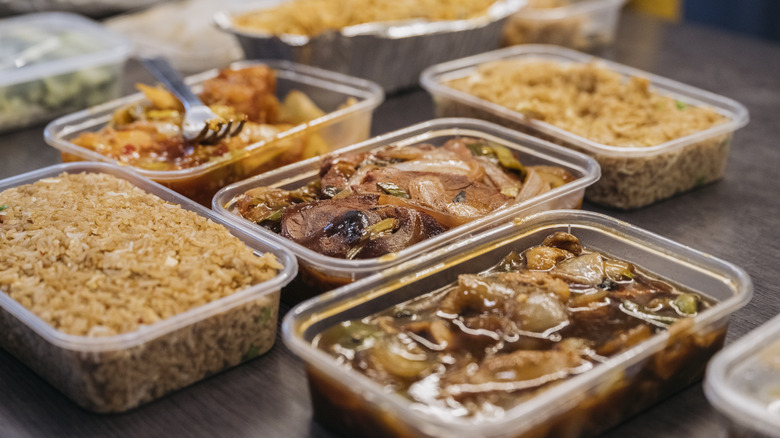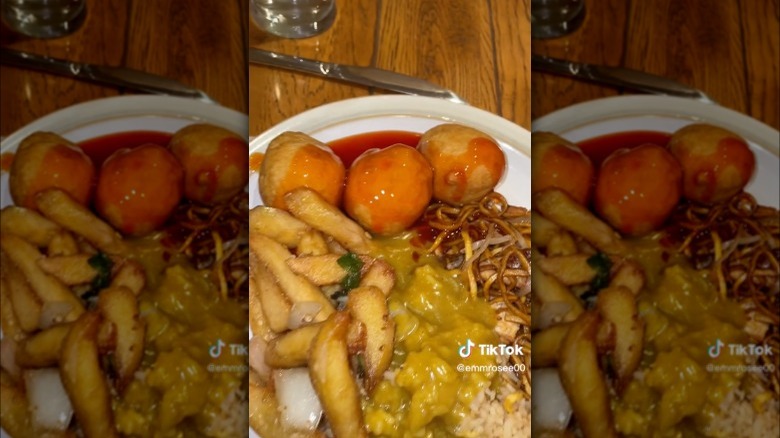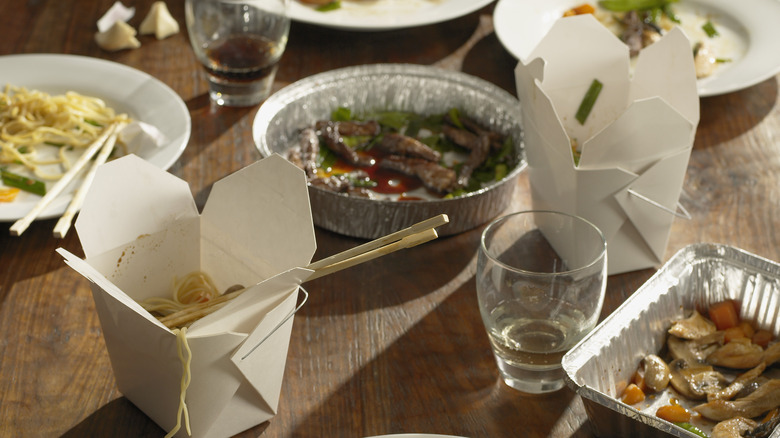The British Chinese Food TikTok Controversy Explained
When you think of Chinese takeout, you might imagine a fold-up paper box overflowing with sweet and spicy kung pao chicken, beef and broccoli, or veggie-packed lo mein noodles. That is, if you're American. If you're British, your meal will look a little different. Your food will usually arrive in Tupperware containers, for starters, which you'll then decant onto your plate. You might have ordered crispy chili beef, fried chicken balls, egg fried rice, and, to the horror of everyone across the pond, salt and pepper chips (aka fries). All topped off with a generous drenching of bright yellow curry sauce.
If this sight seems unusual to you, you're not alone. Over the past few days, American confusion surrounding British Chinese food has dominated TikTok's For You page for users in both countries, with videos tagged #chinesetakeaway amassing over 290 million views. Many of these videos involve Americans expressing outrage over the "dry" and "beige" nature of the cuisine. But it's not just the content of British Chinese food that is perplexing those outside of the country — it's the way it's referred to. Instead of saying they're ordering "takeout," Brits usually say they're ordering "a Chinese." It's this phrasing that has offended and confused some Americans, which has in turn led to Brits explaining where the slang originated from.
Why do Brits call it 'A Chinese'?
Although Chinese takeaway hauls have been common on U.K. TikTok for a while now, they have seemingly only reached the U.S. fairly recently. The controversy accelerated when American TikTokers @dandydemon and @soogia.1 questioned the use of the term "a Chinese" across this genre of content. "I know it's not intended to be racist, but it just kind of feels like it is a little," Soogia says in a now-viral video. "Here in the United States we call it 'Chinese food' like we do all other foods," she explains, before questioning whether Brits would refer to other cuisines similarly, such as "a Greek" or "a Mexican."
@soogia1 The Al Gore Rhythm can be so funny sometimes. #achinese #chinesefood #britishchinesefood #americanchinesefood #interestingcombination #currysauce #chickenballs #chips #greenscreenvideo
Most often, the answer is yes. The use of "a Chinese" can be attributed to differences in grammar between the two countries. In British English, speakers refer to "a Chinese takeaway" as a singular object, similar to a meal. This seems unusual to people in the U.S., where takeout is used as a mass noun, similar to the word food. Brits love to abbreviate everything, and so this gets shortened to "a Chinese," as well as "an Indian" for an Indian takeaway, and "a Full English" for a cooked breakfast with bacon, eggs, etc.
Soogia clarified this in a follow-up video, while also explaining why the term can feel offensive to Americans. "Here, when somebody refers to a person as 'A Chinese,' 'A Mexican,' it is almost always in an effort to strip that person of their humanity," she says.
Why is British Chinese food different to American Chinese food?
As for why British and American Chinese food looks and tastes so different from each other, the answer, at least partially, lies in the influence of the broader population — including other immigrant communities. The U.K. has a large Indian community, and it is thought that curry sauce first came from British India in the 18th century, before being introduced into Chinese takeaways in the U.K. Similarly, fish and chips is a popular takeaway option in the U.K. and chippies are common, which likely influenced other takeaways to also sell chips.
American Chinese food has also undoubtedly been shaped by immigrant populations, especially in New York. It became popular with Jewish communities in particular because it doesn't combine dairy and meat, and Jewish influence has since led to the creation of dishes including pastrami egg rolls, and corned beef and black truffle egg rolls. This is also why it's still common today for American Jewish families to eat Chinese food at Christmas.
Whatever you think of fries and chicken balls, in reality, there are many similarities between Chinese dishes in the U.S. and the U.K. that can be celebrated, as well as the countries' many differences. Both cuisines feature sweet, sour, and spicy sauces, as well as thick noodles and fried meats. And ultimately, both are delicious in their own way.


